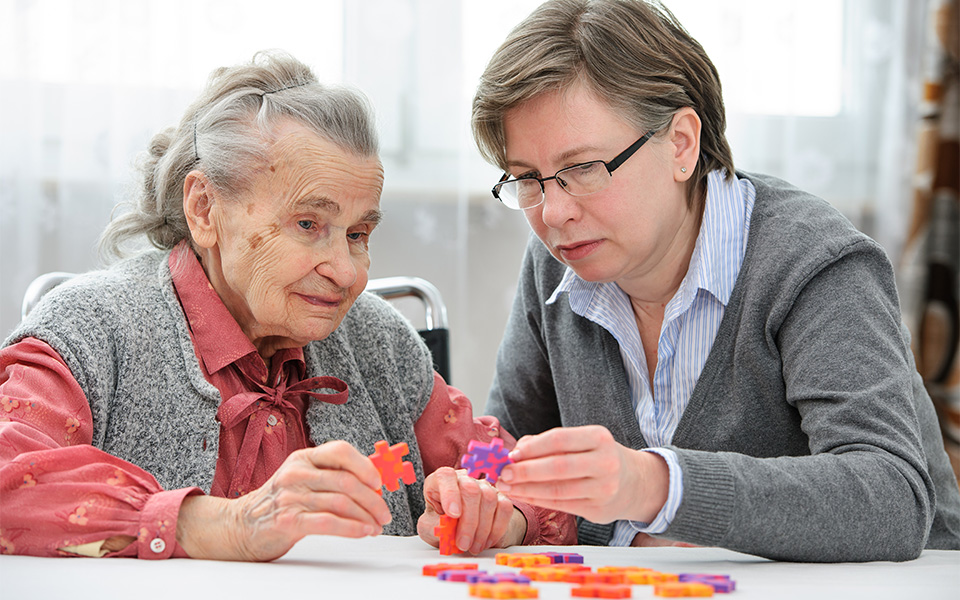No. Dementia is a term that describes a group of diseases, one of which includes Alzheimer’s. Learn about the differences between the two conditions.
What is Dementia?
It’s a group of diseases that lead to a decline in cognition, memory formation and thinking skills. Dementia is not a natural part of the aging process as it’s caused by damage to brain cells. There are several stages of dementia that present distinct symptoms.
Types of Dementia
Alzheimer’s disease is the most common type of dementia and accounts for 60% to 80% of cases.
Other types of dementia include:
Lewy body dementia: This progressive dementia occurs when proteins called Lewy bodies clump together in your brain. You may experience visual hallucinations, tremors and rigidity.
Vascular dementia: Reduced blood flow to your brain damages its blood vessels. Stroke and reduced circulation can result in vascular dementia.
Frontotemporal dementia: Nerve cells and connections begin to break down in the parts of your brain responsible for personality, thinking and behavior.
Mixed dementia: This type of dementia results from a combination of causes that contribute to the disease’s progression.
Symptoms of Dementia
- Memory loss
- Changes in thinking and decision-making
- Decreased focus and attention
- Personality or behavior changes
- Inability to handle complex tasks or multitasking
- Trouble finding the right word or phrase
- Loss of appetite
- Confusion
- Disorientation
- Depression
- Anxiety
- Paranoia
What is Alzheimer’s Disease?
It’s a type of dementia characterized by changes in your brain caused by protein deposits, or plaques, that clump around nerve cells. Those amyloid-beta proteins affect your hippocampus, which controls and stores memories.
Roughly 6.5 million Americans 65 and older have Alzheimer’s disease. The condition progresses over time, but can be slowed and sometimes treated with certain medications.
Symptoms of Alzheimer’s Disease
- Repeating phrases or questions frequently
- Memory loss that worsens over time
- Forgetting recent conversations or events
- Forgetting names of people and objects
- Difficulty concentrating
- Inability to multitask
- Misplacing belongings
- Getting lost in familiar places
- Social withdrawal
- Mood swings, anger or aggression
- Wandering
- Reduced spatial awareness
- Impulsive behavior
Risk Factors for Dementia and Alzheimer’s Disease
The risk of dementia varies between men and women. Your risk can increase with age. A family history of dementia or Alzheimer’s, especially in an immediate family member, could mean you’re more likely to develop either condition.
You may also have a chance of developing dementia or Alzheimer’s if you have:
- Head trauma or injury
- Huntington’s disease
- Parkinson’s disease
- Uncontrolled diabetes
- Cardiovascular disease
Poor lifestyle choices can affect your chances of developing dementia and Alzheimer’s, including:
- A lack of exercise
- Poor diet
- Heavy drinking
- Smoking or exposure to secondhand smoke
Find Quality Memory Care at Embassy Healthcare
Empower Memory Care offers a holistic approach to dementia care. We establish an interdisciplinary team that addresses each of your health and wellness needs to ensure you receive the medical, physical and emotional support you require.
Our dedicated memory care facilities are secure environments designed to help you feel safe and reduce your chance of injury or falling. We will perform several assessments to determine the level of care you require and create a personalized plan to maintain your quality of living.
Call 216-378-2050 to learn more about our services and schedule a tour online.

